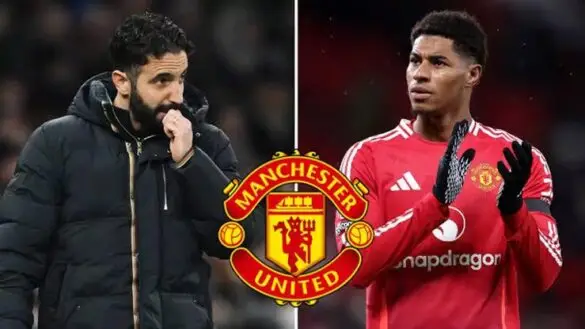Manchester United outcast Marcus Rashford delivers strong message to Manchester United and Ruben Amorim after home loss against Brighton. In a dramatic turn of events, the outcast winger took to social media to deliver a stirring message to his club and manager Ruben Amorim, making it clear that he was far from pleased with his recent treatment. “You can try to sideline me, but you can never silence me,” Rashford stated in his post, which quickly went viral.

In a season marred by underperformance and internal discord, Manchester United’s recent 3-1 home defeat to Brighton has intensified scrutiny on both the club’s management and its players. Central to the unfolding drama is Marcus Rashford, the once-celebrated winger who now finds himself marginalized under manager Ruben Amorim. Following the disheartening loss, Rashford took to social media to voice his discontent, stating, “You can try to sideline me, but you can never silence me.” This bold declaration has not only gone viral but has also reignited discussions about his future at Old Trafford.
Rashford’s public dissent is the latest chapter in a series of events highlighting the strained relationship between the player and Amorim. The manager has been candid about his expectations, emphasizing the need for long-serving players to step up during challenging times. He remarked, “Some guys have a big responsibility here because they are here for a long time… We have to face it and be strong in this moment.”
Despite these calls for leadership, Rashford’s recent performances have been underwhelming, leading to his exclusion from several match-day squads. Amorim has consistently maintained that selections are based on training performances and the overall benefit to the team. Addressing Rashford’s situation, he stated, “He wants to play. He is trying. It’s only my decision. When I feel that is the right moment I will change something.”
The tension between player and manager has fueled speculation about Rashford’s future. Reports suggest that the forward is seeking opportunities elsewhere, with clubs like Barcelona expressing interest. Notably, Rashford has reportedly given Barcelona a 24-hour deadline to finalize a loan deal, indicating his eagerness for a new environment.
Amidst this turmoil, Manchester United’s performance on the pitch has been dismal. The defeat to Brighton marked their sixth home loss of the season, a feat not seen since the 1989-1990 campaign. Manager Ruben Amorim did not mince words, stating, “We are perhaps the worst team in Manchester United’s history.” Such admissions underscore the gravity of the club’s current predicament.
The broader context reveals a club grappling with identity and performance issues. Amorim’s tenure has been marked by a series of disappointing results, leading to questions about his tactical approach and man-management skills. The decision to sideline key players like Rashford has been met with criticism, with former United legends questioning the manager’s strategies. Teddy Sheringham, for instance, remarked that Sir Alex Ferguson would have handled the situation differently, suggesting that Rashford would have been shown the door for his public dissent.
The club’s struggles are not limited to on-field performances. Off the pitch, there are murmurs of discontent among the fanbase, who are disheartened by the team’s lackluster displays and apparent lack of direction. The potential departure of homegrown talents like Rashford only adds to the supporters’ woes, as they see it as a sign of deeper systemic issues within the club’s hierarchy.
As the January transfer window approaches, Manchester United faces critical decisions. The possibility of a swap deal involving Rashford and Napoli’s Victor Osimhen has been mooted, aiming to address the club’s striker woes. Such moves indicate a potential overhaul in the squad, reflecting the urgent need for a turnaround in fortunes.
In conclusion, Marcus Rashford’s emphatic message serves as a microcosm of Manchester United’s broader challenges. The discord between player and manager, coupled with dismal performances, paints a grim picture for the club’s immediate future. Whether Rashford’s words will spark a change within Old Trafford or signal the end of his tenure remains to be seen. One thing is certain: Manchester United is at a crossroads, and the decisions made in the coming weeks will have long-lasting implications for its legacy and
aspirations.
Manchester United’s ongoing struggles have been brought into sharp focus following their 3-1 home defeat to Brighton, with Marcus Rashford’s escalating tension with manager Ruben Amorim emblematic of deeper systemic issues at the club. Rashford’s recent social media statement—“You can try to sideline me, but you can never silence me”—has gone viral, sparking debates about his future and the club’s trajectory.
### **Rashford vs. Amorim: A Growing Rift**
Rashford’s public dissent reflects mounting frustrations. Once the poster boy of United’s attacking prowess, his marginalization under Amorim has led to speculation about his diminishing role. Amorim, for his part, has been vocal about his expectations for experienced players, criticizing their inability to lead during turbulent times.
Amorim’s comments, such as “Some guys have a big responsibility here because they are here for a long time,” are thinly veiled references to players like Rashford. The manager has repeatedly emphasized that squad selections are based on merit, training performance, and the team’s needs, making Rashford’s exclusion from key matches a pointed statement.
### **Speculation Over Rashford’s Future**
Reports suggest Rashford is actively seeking a move away from Old Trafford, with Barcelona leading the chase. His reported 24-hour ultimatum to the Catalan giants to finalize a loan deal underscores his determination to find a fresh start. This potential move has divided opinion among fans and pundits, with some viewing it as a necessary reset for both Rashford and the club.
A possible swap deal involving Napoli’s Victor Osimhen has also surfaced, hinting at a broader overhaul of United’s squad. Such a move would address the team’s persistent striker issues while marking a significant shift in the club’s strategy.
### **Amorim Under Fire**
The pressure on Ruben Amorim is mounting. His admission that United might be “the worst team in Manchester United’s history” speaks volumes about the club’s current crisis. With six home losses already this season—reminiscent of the 1989-1990 campaign—questions about his tactical acumen and leadership are intensifying.
Former players have not held back in their criticism. Teddy Sheringham, for instance, suggested that Sir Alex Ferguson would have handled Rashford’s dissent decisively, either by reintegrating him or showing him the door. Amorim’s approach, however, has drawn ire for seemingly alienating key players at a time when unity is crucial.
### **Fan Discontent and Wider Implications**
Off the pitch, the fanbase is increasingly disillusioned. The lack of cohesion, clear direction, and consistent performances has left supporters questioning the club’s hierarchy and long-term vision. Rashford’s potential departure is seen by many as a failure to retain and nurture homegrown talent—a hallmark of United’s historic success.
### **The January Window: A Turning Point**
The upcoming transfer window presents an opportunity for United to redefine their season. Whether through player swaps, new signings, or managerial adjustments, the decisions made in January will be pivotal. The potential acquisition of Osimhen, while promising, cannot mask the structural and cultural issues that need addressing.
### **Conclusion**
Marcus Rashford’s bold statement encapsulates Manchester United’s current predicament: a club at odds with itself, struggling for identity and direction. His future, along with the decisions of Ruben Amorim and the board, will shape the trajectory of United’s season and potentially its long-term legacy. For now, the club remains at a crossroads, with the weight of its illustrious history pressing heavily on its present struggles.







